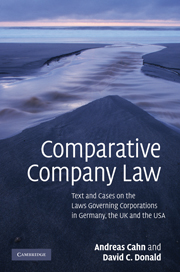 Comparative Company Law
Comparative Company Law from PART I - The essential qualities of the corporation
Required reading
EU: First Company Law Directive, art. 1
D: AktG, § 1
UK: CA 2006, secs. 1, 3, 4
US: DGCL, § 101(b); Model Act, §§ 1.40(4), 3.01(a)
Approaching comparative company law
The approach coordinates
The disciplines of “comparative law” in general and “comparative company law” in particular are natural companions to the globalization of social, political and economic activity. The course of economic and political developments in recent decades has thus increased the amount of comparative law taking place at every level, whether it be that of fact-oriented practitioners, result-seeking legislators and development agencies, or theory-focused academics. Each of these activities has its own interests, priorities and goals. Nevertheless, there are certain “approach coordinates” that mark the path for all their comparative studies. This introductory chapter will outline some important approach coordinates for the comparison of the laws that govern public companies in the United States, the United Kingdom and Germany.
Just as the merchants who engaged in the earliest forms of international trade developed a commercial law that was trans-jurisdictional,so today merchants and their counsel are often at the forefront of comparative legal activity. When a transaction spans international borders, the persons responsible for structuring it must of necessity become corporatists. As Professor Klaus Hopt has observed, lawyers and legal counsel “are the real experts in both conflict of company laws and of foreign company laws … Working out the best company and tax law structures for international mergers, and forming and doing legal work for groups and tax haven operations, is a high, creative art.”
To save this book to your Kindle, first ensure no-reply@cambridge.org is added to your Approved Personal Document E-mail List under your Personal Document Settings on the Manage Your Content and Devices page of your Amazon account. Then enter the ‘name’ part of your Kindle email address below. Find out more about saving to your Kindle.
Note you can select to save to either the @free.kindle.com or @kindle.com variations. ‘@free.kindle.com’ emails are free but can only be saved to your device when it is connected to wi-fi. ‘@kindle.com’ emails can be delivered even when you are not connected to wi-fi, but note that service fees apply.
Find out more about the Kindle Personal Document Service.
To save content items to your account, please confirm that you agree to abide by our usage policies. If this is the first time you use this feature, you will be asked to authorise Cambridge Core to connect with your account. Find out more about saving content to Dropbox.
To save content items to your account, please confirm that you agree to abide by our usage policies. If this is the first time you use this feature, you will be asked to authorise Cambridge Core to connect with your account. Find out more about saving content to Google Drive.